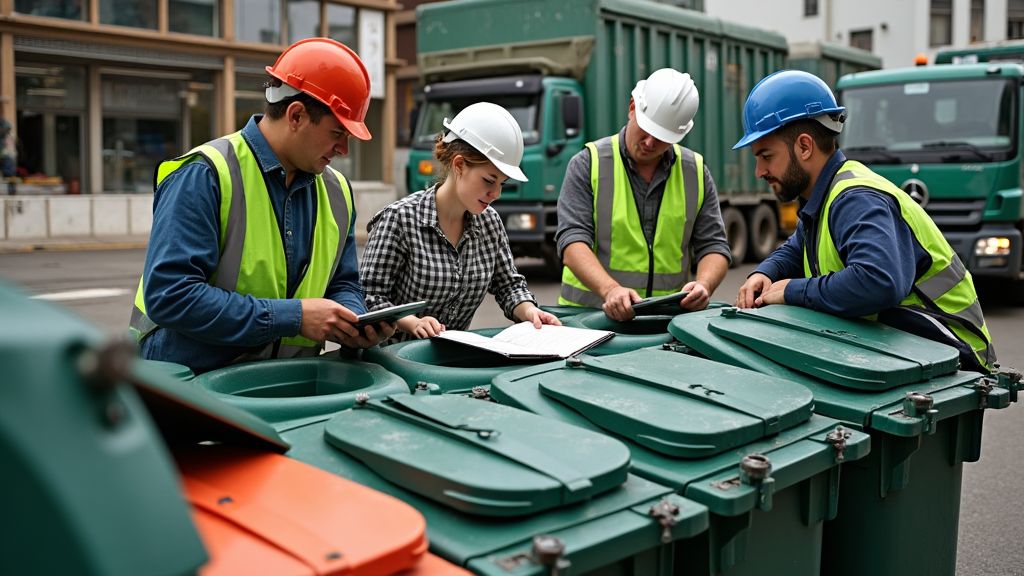Unlocking the World of Waste Management Jobs: A Gateway to Green Careers
The waste management industry is a vast and dynamic sector that plays a crucial role in keeping our environment clean and sustainable. From innovative recycling efforts to managing hazardous waste, the field offers a plethora of career opportunities. Let’s delve into the diverse job roles and the rising demand for skilled workers in this green sector.

The Significance of Waste Management
Waste management isn’t just about dealing with trash; it’s about creating a healthier environment for all. Effective waste management practices are essential in reducing pollution, conserving natural resources, and mitigating climate change. As communities and industries become more environmentally conscious, the demand for professionals in this field continues to grow.
Emerging Job Roles in Waste Management
As the industry evolves, so do the job roles. The sector now offers a range of positions from traditional waste disposal jobs to highly specialized roles. Some of the emerging job titles include Waste Management Consultant, Recycling Coordinator, Sustainability Officer, and Environmental Engineer. Each role plays a unique part in ensuring that waste is appropriately managed and the environment is protected.
Meet Jane: A Waste Management Consultant
Jane Thompson is a Waste Management Consultant who helps businesses develop and implement waste reduction strategies. With a background in environmental science, Jane advises companies on best practices for recycling, composting, and reducing their overall waste footprint. She works closely with clients to ensure they meet regulatory requirements while also achieving their sustainability goals.
Recycling Coordinators: Champions of Recyclables
Recycling Coordinators like Mark Robinson play a pivotal role in overseeing recycling programs for communities and organizations. They are responsible for educating the public on recycling practices, managing recycling facilities, and ensuring that collected materials are processed efficiently. Their work is essential in the effort to divert waste from landfills and promote a circular economy.
Sustainability Officers: The Architects of Green Policies
Sustainability Officers, such as Lucy White, are tasked with developing and implementing policies that promote environmental responsibility within organizations. They work on everything from energy efficiency programs to sustainable procurement practices. Lucy’s role involves collaborating with various departments to ensure that the company’s operations align with its sustainability objectives.
Environmental Engineers: Innovating for a Cleaner Future
Environmental Engineers like Eric Johnson create solutions to environmental problems through design and technology. Eric works on projects such as designing waste treatment plants, developing pollution control systems, and improving recycling processes. Their expertise is crucial in advancing waste management technologies and enhancing the effectiveness of waste reduction efforts.
The Growth of Green Technologies in Waste Management
The intersection of technology and waste management has led to exciting developments in the field. Green technologies, such as smart waste bins and advanced recycling facilities, are transforming how waste is collected, sorted, and processed. Innovations like these not only improve efficiency but also make waste management more sustainable.
Training and Education for Future Professionals
A career in waste management requires a combination of education, training, and experience. Many universities now offer specialized programs in environmental science and sustainability. Additionally, certifications such as the Certified Recycling Professional (CRP) and Continuous Learning modules ensure that professionals stay updated with the latest industry practices and regulations.
Making a Positive Impact: The Rewards of a Career in Waste Management
Working in waste management can be incredibly rewarding. Professionals in this field play a vital role in protecting the environment and promoting sustainable practices. The satisfaction of knowing that your work directly contributes to a cleaner planet is immeasurable. Moreover, the field is ripe with opportunities for growth and innovation, making it an exciting career choice for those passionate about sustainability.
